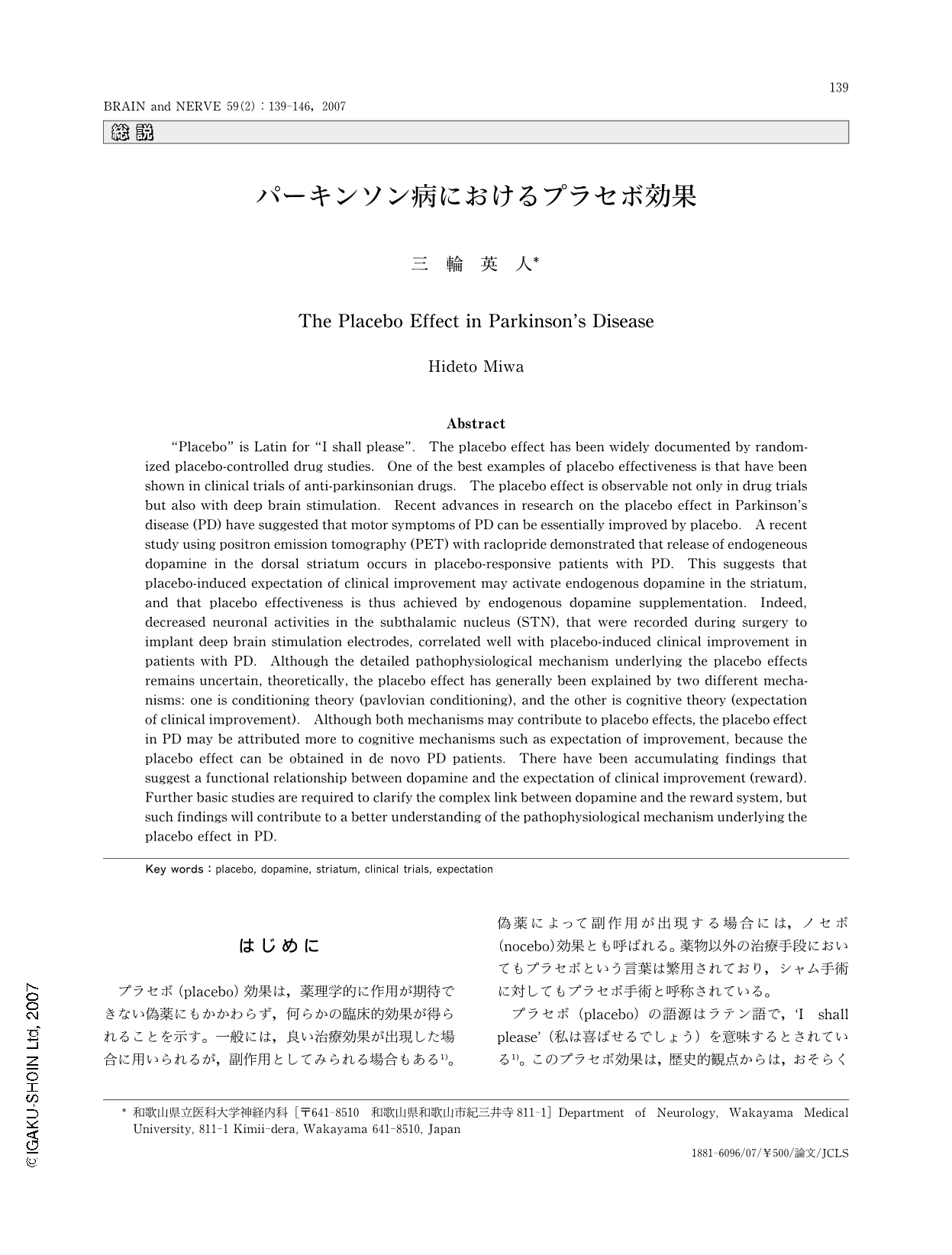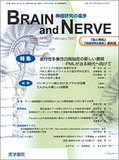Japanese
English
- 有料閲覧
- Abstract 文献概要
- 1ページ目 Look Inside
- 参考文献 Reference
はじめに
プラセボ(placebo)効果は,薬理学的に作用が期待できない偽薬にもかかわらず,何らかの臨床的効果が得られることを示す。一般には,良い治療効果が出現した場合に用いられるが,副作用としてみられる場合もある1)。偽薬によって副作用が出現する場合には,ノセボ(nocebo)効果とも呼ばれる。薬物以外の治療手段においてもプラセボという言葉は繁用されており,シャム手術に対してもプラセボ手術と呼称されている。
プラセボ(placebo)の語源はラテン語で,‘I shall please'(私は喜ばせるでしょう)を意味するとされている1)。このプラセボ効果は,歴史的観点からは,おそらくは近代的医学の発展前には治療効果の本質であった可能性すらあるのではないだろうか。現代の日常診療の中でさえ,実際の医学的治療におけるかなりの部分を占めている可能性が高い。しかし,プラセボを治療薬の1つとして位置づけ得るかに関しては,人道的見地からも,また客観的治療効果の面からも批判がある。Hrobjartssonら(2001)の論文2)は良く知られている。プラセボが使用された100編以上の臨床試験データをレビューした結果,痛み以外の症状を改善する十分な証拠は得られなかったと述べ,新薬開発のための臨床試験以外に治療手段としての偽薬を使用することを批判している。一方で,実地臨床の場において,プラセボ効果が特に顕著であると広く実感されている疾患がある。疼痛,抑うつ,パーキンソン病である3)。本稿では,パーキンソン病におけるプラセボ効果に焦点を当て,その効果が本質的に病態を改善しているらしい臨床的知見や,プラセボ効果とドパミンに関する基礎医学的研究成果などについて述べたい。
Abstract
“Placebo”is Latin for “I shall please”. The placebo effect has been widely documented by randomized placebo-controlled drug studies. One of the best examples of placebo effectiveness is that have been shown in clinical trials of anti-parkinsonian drugs. The placebo effect is observable not only in drug trials but also with deep brain stimulation. Recent advances in research on the placebo effect in Parkinson's disease (PD)have suggested that motor symptoms of PD can be essentially improved by placebo. A recent study using positron emission tomography(PET)with raclopride demonstrated that release of endogeneous dopamine in the dorsal striatum occurs in placebo-responsive patients with PD. This suggests that placebo-induced expectation of clinical improvement may activate endogenous dopamine in the striatum, and that placebo effectiveness is thus achieved by endogenous dopamine supplementation. Indeed, decreased neuronal activities in the subthalamic nucleus (STN), that were recorded during surgery to implant deep brain stimulation electrodes, correlated well with placebo-induced clinical improvement in patients with PD. Although the detailed pathophysiological mechanism underlying the placebo effects remains uncertain, theoretically, the placebo effect has generally been explained by two different mechanisms: one is conditioning theory (pavlovian conditioning), and the other is cognitive theory (expectation of clinical improvement). Although both mechanisms may contribute to placebo effects,the placebo effect in PD may be attributed more to cognitive mechanisms such as expectation of improvement, because the placebo effect can be obtained in de novo PD patients. There have been accumulating findings that suggest a functional relationship between dopamine and the expectation of clinical improvement (reward). Further basic studies are required to clarify the complex link between dopamine and the reward system,but such findings will contribute to a better understanding of the pathophysiological mechanism underlying the placebo effect in PD.

Copyright © 2007, Igaku-Shoin Ltd. All rights reserved.


